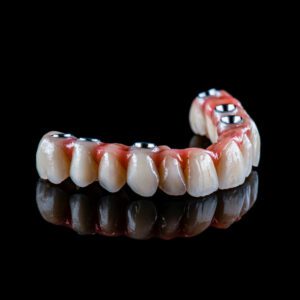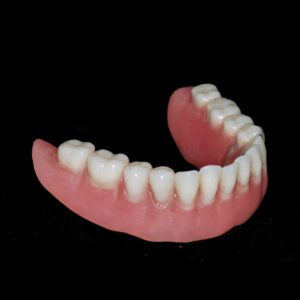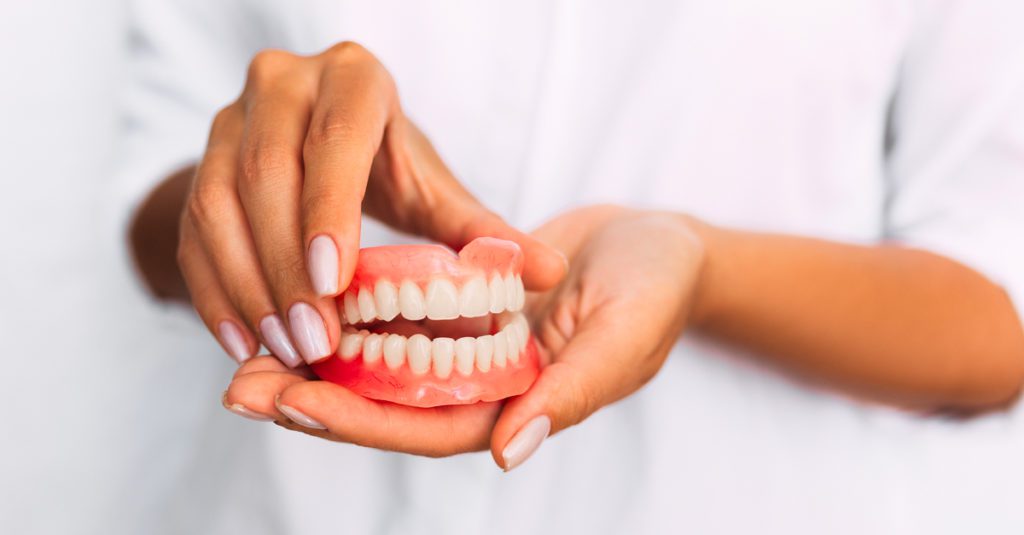In the world of tooth replacement options, dental implants and dentures are two popular choices. Both options offer unique benefits and considerations, making it essential to understand the differences.
In this article, we’ll explore the differences between dental implants and dentures, helping you make an informed decision about the best tooth replacement option for your needs.
Understanding Dental Implants

Dental implants are titanium screws surgically embedded in the jawbone to replace missing teeth. They serve as a long-term, permanent solution for tooth loss. Dental implants can be either endosteal or subperiosteal. Endosteal implants are placed directly into the jawbone, while subperiosteal implants sit on top of the jawbone. The choice between the two types will depend on your jawbone structure.
One of the significant advantages of dental implants is their natural appearance. They closely mimic the look and feel of natural teeth, making it difficult for others to distinguish them as artificial. Additionally, dental implants offer stability and durability. With proper care, they can last for decades, providing a success rate of up to 98%.
However, it’s important to note that dental implant procedures can be lengthy and require several months for completion. The upfront cost of dental implants is also higher compared to other tooth replacement options. While dental implants are suitable for most patients, they require sufficient jawbone for successful placement.
Exploring Dentures as an Option for Teeth Replacement

Dentures are removable replacements for missing teeth. They can be either full dentures, replacing all teeth in the upper or lower jaw, or partial dentures, replacing a few missing teeth. Dentures are designed to match the existing teeth and are typically made of hard resin.
One advantage of dentures is their affordability compared to dental implants. They can be a more cost-effective option for patients with budget constraints, but unlike dental implants, they’re not a permanent solution.
Another downside of dentures is they require regular maintenance, and they can also become loose or make clicking noises while speaking or chewing. Over time, dentures may need to be replaced due to wear and tear. Unlike dental implants, dentures do not stimulate the jawbone, leading to potential bone loss over time.
Comparing the Benefits
Dental Implants
- Permanent and natural-looking tooth replacement
- Long-lasting and durable with a high success rate
- Mimic the size and shape of natural teeth
- Cost-effective in the long run compared to other options
- Prevent bone loss and strengthen the jawbone
Dentures
- Provide support to the facial structures
- Easy to clean and maintain
- Improve smile aesthetics and boost confidence
- Suitable for patients with unhealthy gums or weak jawbones
Dental Implants vs. Dentures: Procedure and Treatment Length

Dental Implants
The dental implant procedure involves several stages and may require the expertise of different dental specialists. The process begins with a thorough examination of the gums, teeth, and jawbone to assess their health. If necessary, a bone graft may be performed to enhance the jawbone’s strength.
Next, the oral surgeon makes an incision in the gum and drills holes into the jawbone. The dental implant is then placed into the hole, and osseointegration occurs over a period of two to six months. Once the implant has fused with the bone, an abutment is attached to connect the replacement tooth. Finally, a custom-made crown is placed on top of the abutment.
Dentures
The denture procedure starts with a dental examination to evaluate the oral health. If any decayed teeth or infections are present, they are addressed before proceeding with the denture treatment. An impression or mold of the teeth is taken and sent to a dental lab for the creation of custom dentures. Once the dentures are ready, they are fitted inside the mouth.
The treatment length for dentures can vary depending on factors such as complete or partial dentures, healing time, and the need for tooth extraction. Typically, denture treatment can take between six weeks and three months.
Dental Implants vs. Dentures: Cost Comparison
The cost of dental implants and dentures can vary depending on various factors, including the number of teeth to be replaced, the type of materials used, and the complexity of the procedure. Generally, dental implants have a higher upfront cost compared to dentures. A single dental implant can cost around $2,500 to $3000, and the total cost for a full mouth implant can reach up to $34,000.
On the other hand, dentures are more affordable, with prices ranging from $1,100 to $3,000. The cost can vary based on whether the dentures are complete or partial and the materials used for fabrication.
Maintenance and Care
Dental Implants
Maintaining dental implants involves practicing good oral hygiene. Regular brushing and flossing are essential to keep the implant and surrounding teeth clean. Using an oral rinse can help prevent bad breath and kill bacteria in the mouth. Regular visits to the dentist for check-ups and professional cleanings are also recommended.
Dentures
Dentures require special care and maintenance. After eating, they should be removed and rinsed. It is important to clean the mouth thoroughly before putting the dentures back in. Overnight soaking in a denture solution is necessary to keep them clean and free from bacteria. Brushing the dentures at least once a day helps remove any buildup. Regular visits to the dentist are also crucial for adjustments and evaluations.
Making the Right Choice: Dental Implants or Dentures?

The decision between dental implants and dentures will depend on various factors, including your personal preferences, oral health condition, budget, and long-term goals. Dental implants are an excellent choice if you’re looking for a permanent solution that closely resembles natural teeth. They offer durability, aesthetics, and functionality.
On the other hand, dentures are a more affordable option and may be suitable if you have a weak jaw bone or unhealthy gums. While they may require more maintenance, dentures can still provide satisfactory results in terms of appearance and functionality.
To determine the best tooth replacement option for you, it is advisable to consult with a dental professional who can assess your specific needs and provide personalised recommendations. They can evaluate your oral health condition, discuss the pros and cons of each option, and help you make an informed decision.
Frequently Asked Questions
Are dental implants better than dentures?
Dental implants provide a permanent and natural-looking tooth replacement, making them the ideal tooth replacement option for most patients.
What are the advantages of implants over dentures?
Dental implants offer stability, prevent bone loss, and closely resemble natural teeth, providing enhanced aesthetics and functionality.
Why do dentists not recommend dentures?
Dentures may not be recommended in cases of significant bone loss or gum disease, as they may not provide the desired stability and long-term benefits.
How much does it cost to replace all of your teeth?
The cost of fully replacing teeth with dental implants can vary, but it can reach around $34,000 for full mouth implants. However, many dental implant providers offer payment plans to help make this life-changing treatment more accessible for patients on a budget.
Can regular dentures be permanently attached?
Yes, regular dentures can be permanently attached using implant-supported dentures, providing improved stability and functionality.
Our Verdict
Dental implants are the gold standard when it comes to tooth replacement options. Although this option can be more costly, it will give you a more permanent, natural looking smile.
Whether you’re considering dentures or implants, we encourage you to consult with a dental professional to determine the best choice for your specific needs. Remember, maintaining good oral hygiene and regular dental check-ups are essential for the longevity and success of any tooth replacement option.
Here at the Melbourne Dental Implant & Sleep Centre, we’re here to help you make an informed choice. Contact us today on 1800 IMPLANT to schedule a consultation and embark on your dental implant journey with confidence.

